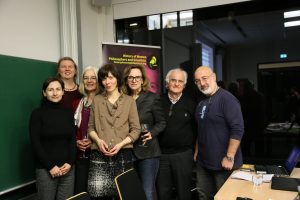
Prof. Ruth Hagengruber and Prof. Sarah Hutton (Photo by Roland Mikosch)
Some members of the Center’s research group on the work of Du Châtelet presented first new insights into the manuscripts. Moreover, it welcomed Prof. Sarah Hutton (University of York), a longtime supporter of the Center, as commentator and two scholars from Greece, Prof. George Vlahakis (Hellenic Open University Patras) and Prof. Manolis Patiniotis (National and Kapodistrian University of Athens). The Greek guests contributed to the workshop’s aim to present new insights and approaches in Du Châtelet studies a valuable presentation on the “Greek” Emilie and her role for the re-appearance of metaphysics in natural philosophy books during modern Greek Enlightenment.
The workshop started with some words of welcome by Sarah Hutton who recapitulated the history of the Center which goes back to 2006 when it began as a teaching and research area and an international conference in Potsdam “Emilie Du Châtelet und die deutsche Aufklärung” on the occasion of her 300th birthday.
Ana Rodrigues presented in her talk Du Châtelets moral and social philosophy in the light of her critical reception of the works of La Mettrie and Mandeville. Both thinkers are of eminent importance in the development of her thoughts on morals. Especially her reception of Mandeville’s Fable of the Bees at the beginning of her scientific career is fundamental as she develops in her commentary and so-called translation her anthropological premises and foundation of morals. Ana Rodrigues suggested in her talk a new reading of this work that presents a particular challenge to the interpreter as we still don’t have a fitting genre designation for this kind of text. A new interpretative approach as suggested in this talk promises to open up a completely renewed debate about Du Châtelet’s moral philosophy which has been underestimated so far.
Stefanie Ertz gave an overview of the content and significance of the St. Petersburg manuscripts of Émilie Du Châtelet and presented cross sections from her editorial work. The St. Petersburg convolute contains, not only several copies of Mme Du Châtelet‘s translation of Mandeville’s Fable of the Bees but also two major pieces (the Chapitre 5 sur la liberté and her annotations to Voltaire‘s Traité de Métaphysique) documenting her controversial exchange with Voltaire on the issue of free will, the foundation of morals, and the basic principles of human society. The production period of these writings was also a period of her most intensive reflection on the epistemological foundations of natural science and on the basic notions of scientific ontology, so that the St. Petersburg papers are of invaluable importance for the reconstruction of Mme Du Châtelet’s metaphysical thought, and, once edited in the form they deserve, promise to contribute substantially to our knowledge of Mme Du Châtelet’s intellectual biography.

Prof. Manolis Patiniotis (Photo by Roland Mikosch)
Finally, George Vlahakis and Manolis Patiniotis demonstrated in their common presentation the impact the French philosopher Du Châtelet had in the formation of the natural philosophy discourse in the Orthodox millet of the Ottoman Empire during the so-called long 18th century. Du Châtelet’s ideas and methodological approach are to be found in almost every text of natural philosophy composed in the context of Modern Greek Enlightenment and in some cases also in works compiled after the establishment of the independent Greek State.
Vlahakis and Patiniotis presented some examples about the way Greek scholars used arguments proposed by Du Châtelet considering the treatment of “Newtonian” laws of motion and the notion of central forces. Though her work remained in the shadow of the mainstream historiography of science in Greece until recently, it has become evident that she played a crucial role for the synthesis Greek speaking scholars attempted between the rational examination of nature and metaphysics.
The team of the Center would like to thank our guests for all the inspiration and enrichment of our workshop. Thank you to Sarah Hutton, George Vlahakis and Manolis Patiniotis!
(AR, SE)

(f.l.t.r.) Ana Rodrigues, Julia Lerius, Prof. Sarah Hutton, Dr. Stefanie Ertz, Prof. Ruth Hagengruber, Prof. George Vlahakis and Prof. Manolis Patiniotis (Photo by Roland Mikosch)
You cannot copy content of this page








